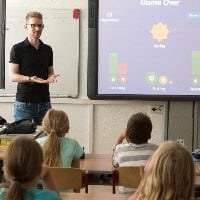(BRUSSELS) – The EU Commission outlined measures Thursday to address gaps in education brought on by the Covid-19 pandemic, and also longer-term to ‘blend’ learning environments in primary and secondary education.
The term ‘blended learning’ in formal education and training describes when a school, educator or student takes more than one approach to the learning process. It can be a blend of school site and other physical environments (companies, training centres, distance learning, outdoor, cultural sites, etc.), or blending different learning tools that can be digital and non-digital.
The shorter-term measures proposed address the most pressing gaps exacerbated by the COVID-19 pandemic, as well as a way forward for blending learning environments and tools in primary and secondary education and training, that can help build more resilient education and training systems.
“Striving for a vision of better quality and inclusive education and training is by no means limited to the COVID-19 context,” said the Education Commissioner Mariya Gabriel: “Today’s proposal maps a vision of the education we want to see in Europe. One that supports the overall goals of the European Education Area and Digital Education Action Plan to promote quality and inclusion, green and digital education across Europe. The recommendation aims to guide Member States in strengthening the preparedness and outreach of their education systems to the benefit of pupils and students, their families and the pedagogical staff.”
Blended learning can help to improve the inclusiveness of education, says the EU executive, particularly due to its flexibility. It can mean better education provision in remote and rural areas, and for those who are part of traveller communities, or residing in hospitals and care centres, and those engaged in high-performance training. All environments and tools should be equally accessible to minority groups, children with disabilities or from socio-economically disadvantaged backgrounds, and should not lead to discrimination or segregation.
The Commission’s proposal for this Council Recommendation includes that Member States should:
- Provide additional learning opportunities and targeted support to learners facing learning difficulties, with special educational needs, from disadvantaged groups or having been otherwise adversely affected by school disruption. This could include, for example, enhanced individualised support, mentoring systems, additional learning time during the school year and/or holiday period, access to additional learning environments, such as public libraries and community spaces, and to after-school services with pedagogical support. In that context, the Commission recommends mobilising or recruiting additional staff to allow more time for individual support at school and in after-school activities;
- Prioritise the physical and mental wellbeing of learners and their families, as well as teachers and trainers. This could include developing guidance for mental health, and including student and teacher wellbeing and anti-bullying policies in school objectives;
- Boost the development of digital competences of learners, of their families and of teachers and trainers, and encouraging investment at school and community level in available devices and connectivity;
- Support effective partnerships for infrastructure and resources between different education providers, including from business, arts, cultural heritage, sport, nature, higher education, and research institutes, the educational resources industry (including technology, publishing, and other curriculum equipment) and educational research.
- Make full use of EU funds and expertise for reforms and investment in infrastructure, tools and pedagogy to increase resilience and preparedness for future-ready schools, in particular Erasmus+, the Recovery and Resilience Facility, European Social Fund Plus, European Regional Development Fund, Digital Europe Programme, Horizon Europe and the Technical Support Instrument.


